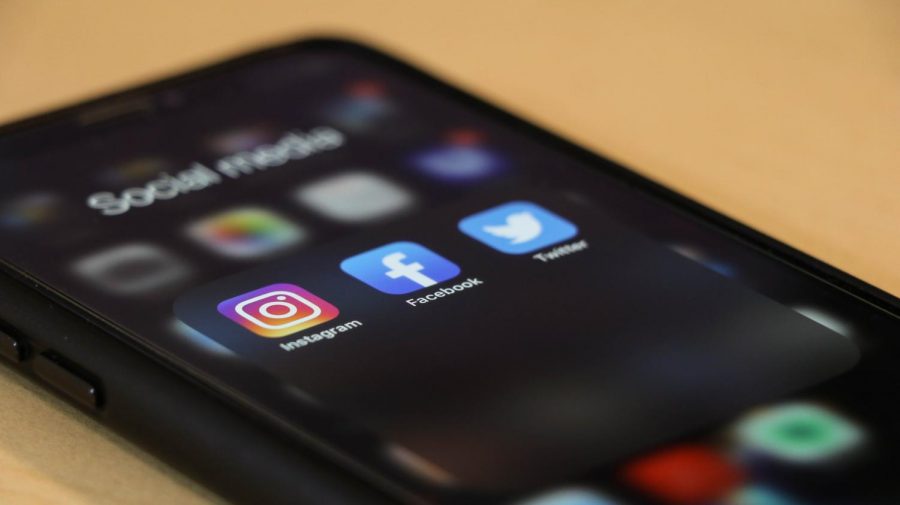How Social Media Affects Mental Health
December 10, 2020
Mental health has become an increasingly prevalent topic during the past few decades. In fact, in 2018 19.1% of American adults reported experiencing problems with mental health, and in 2016 16.5% of American youth (ages 6-17) had a mental health disorder. Although these percentages seem low, that is 47.6 million adults and 7.7 million youth respectively. Within the past two decades, social media has also taken the world by storm and has quickly become a daily part of life for a lot of people. According to the Pew Research Center, 69% of American adults and 81% of American teens use social media platforms. According to a different study, 45% of American teens say they are using a form of social media “almost constantly.” Although daily social media usage has become normalized, many are beginning to question the effects social media can have on one’s mental health and how much social media is too much.
Social media has plenty of benefits, such as connecting with family and friends with a click of a button, streamlining information, and meeting different people with both similar and different interests. Social media also has plenty of problems. One of the most obvious problems there is on the internet: cyber harassment. In fact, 90% of teens believe that online harassment is a problem and 63% would even go as far as to say that it is a “major problem.” A survey in 2018 showed that 1 in 6 teenagers have experienced one of the following: name-calling, false rumors, receiving unsolicited explicit images, stalking, physical threats, and the spreading of explicit images without consent. The effects these events can have on mental health are obvious; they can range from simply lowering self-esteem to, quite potentially, causing intense trauma. Thankfully, the latter is uncommon and only happens in extreme cases. Unfortunately, the effects of low self-esteem can be detrimental over time and can manifest into anxiety, depression, substance abuse, and suicidal thoughts, just to name a few.
In recent years this topic has not only become more talked about but also has become a bigger problem. With the growing accessibility of photo editing software, which is now offered online and in apps for free, more and more social media users are editing their photos and distorting their bodies and faces to seem more conventionally attractive. Seeing seemingly perfect, unachievable bodies and faces constantly, even with the knowledge that they are edited, can be extremely damaging to anyone’s self-image and self-esteem (both of which are key to having good mental health). This is especially true during the teenage years when teen bodies are already changing and maturing. As Dr. Jacqueline Sperling, a psychologist at McLean Hospital pointed out, “[teenagers are] tasked with establishing their identity at a time when the frontal lobes in their brains are not fully developed, and [this results in] a lack of impulse control.” This “lack of impulse control” could very well lead to thoughts of comparison and self-loathing such as ‘why do I not look that that?’ or ‘I’m not pretty/handsome because I don’t look like that.’ The constant exposure to unrealistic body standards and the thoughts that come with it can lead to mental illnesses such as Body Dysmorphic Disorder (BDD). BDD is a lesser-known mental illness where one obsesses over the perceived flaws in their appearance, which affects at least every 1 in 50 people. It can also lead to eating disorders, such as anorexia, nervosa, and bulimia.
A commonly discussed effect social media can have on mental health is showcased by a British study done in 2018, which linked social media to negative changes in sleep patterns. Poor sleeping patterns can introduce another array of problems, such as heightened depression, anxiety, memory loss, or poor academic performance. These problems can also present themselves in a more physical manner: nausea, muscle tension, headaches, and tremors. Although, unlike the others, this problem has a relatively easy fix. The National Sleep Foundation recommends that you abstain from using any type of electronics that emit blue light for 30 minutes before going to bed. However, most phones these days either have a built-in ‘night mode’ or access to an app that restricts the blue light coming from your phone. Enabling this at least 30 minutes before bed should do you just as well.
So, how do you safely consume social media? Like all good things in life, moderation is key. The recommended maximum amount of time spent on social media per day is three hours. Any more than that “may [put you] at heightened risk for mental health problems, particularly internalizing problems.” Be aware of negative self-talk and comparisons as well. Try your best to remember that social media is often only the highlight reel and neglects to show the less glamorous parts of life. Sometimes, what you see on social media may be staged or fake altogether. At any rate, you should also be very keenly aware of how what you’re consuming makes you feel. If a particular trend, person, or account makes you feel less than or uncomfortable, feel free to unfollow them or even block the account or tag if need be.










































































































































